The rescheduled FPP 2022 program updates are available at - https://www.icts.res.in/program/fpp2022
CANCELLED DUE TO COVID-19 RISK.
This program will focus on the model of first-passage percolation (FPP) --- a stochastic growth model --- and its close relatives. Stochastic growth models arise from physics and biology, and have been studied since the 1960s. Such systems address the behavior of growing interfaces, the spread of bacterial colonies, and the fluctuations of long chemical chains in a random potential.
Physicists have made numerous predictions about the common behavior of models in the FPP class. One among them say that these models should have fluctuations of smaller order than is accessible with classical mathematical methods (exhibiting "super-concentration") and limiting laws that deviate from the standard Gaussian. In fact, the limiting fluctuations of models in the FPP class are thought to be universal, and appear in seemingly different contexts like random matrix theory, the zeros of the Riemann zeta function, and the representation theory of the symmetric group.
Much progress has been made in a few "exactly solvable" or "integrable" versions of such models. However, many of the original questions do not seem to be within the reach of the methods afforded by the integrable framework. Instead, researchers have had more success recently with more general methods of a functional analytic or geometric nature. This program will focus on such general methods, including Busemann function and concentration-of-measure techniques, while keeping an eye on methods that may be carried over from the exactly solvable setting.

We gratefully acknowledge NSF support under grant DMS-2002388
 icts
icts res
res in
in

